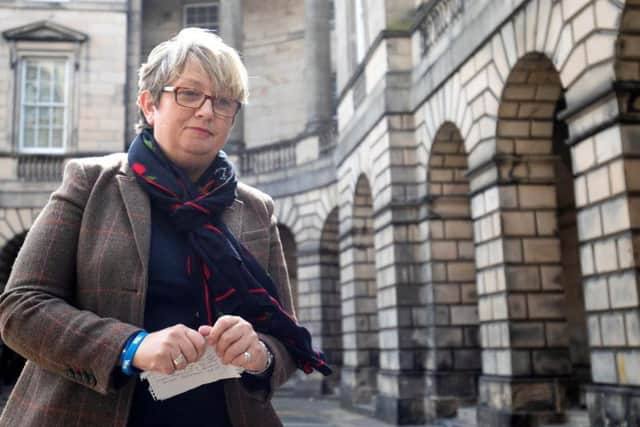Judge to make ruling tomorrow on Scots legal bid to stop 'unlawful' suspension of Parliament


Lord Doherty will consider the matter overnight before delivering his verdict at 10am tomorrow.
The decision comes as senior lawyer Aidan O'Neill QC said that it was “unlawful” and “unconstitutional” for the UK Government to suspend Parliament and called upon a judge to pass an order stopping it.
Advertisement
Hide AdAdvertisement
Hide AdMr O’Neill has requested that Lord Doherty pass an interdict that suspends the Privy Council order made earlier this week.


On Wednesday, the Queen approved the Prime Minister’s plan to prorogue Parliament next month.
Her Majesty made the order after being addressed at Balmoral by members of the Privy Council, an advisory body to the monarch made up of senior politicians.
It means Parliamentarians would have very little time to pass laws to stop a so called no deal Brexit from taking place next month.
House of Commons speaker John Bercow said the decision amounted to a “constitutional outrage”.
Now a cross party group of Parliamentarians - from both the House of Commons and the House of Lords - have instructed lawyers to go to the Court of Session in Edinburgh to stop the plan.
The politicians include Liberal Democrat leader Jo Swinson, SNP MP Joanna Cherry and former Conservative MP Heidi Allen.
On Thursday Mr O’Neill told Lord Doherty that an interdict was needed because the privy court order was “unprecedented”.
Advertisement
Hide AdAdvertisement
Hide AdMr O’Neill also quoted Supreme Court judge Lord Hodge from an earlier case in which he wrote: “I do not exclude the possibility that in the very unlikely event that a parliamentary majority abusively sought to entrench its power by a curtailment of the franchise or similar device, the common law informed by principles of democracy and the rule of law and international norms, would be to declare such legislation unlawful.”
Mr O’Neill then told the court: “A government based on a parliamentary majority one of is abusively seeking to entrench its power not by a curtailment of the franchise, but by suspending Parliament.”
Mr O’Neill said there had been an “improper use” of the power of prorogation of Parliament entrusted to the government.
He said Mr Johnson was incorrect in claiming the government has plenty of time to negotiate a new deal.
Mr O'Neill added: “He knows it is wrong and he says it anyway. That’s what one might call a lie.”
Roddy Dunlop QC, for the government, told the court that prorogation was a lawful legitimate course of action and it had been used many times before.
He said the law allowed Her Majesty to prorogue Parliament and that it would be unlawful for courts to interfere in the matter.
Mr Dunlop said the reasons expressed in the Prime Minister’s letter that he sent to the MPs giving an explanation for prorogation were political ones.
Advertisement
Hide AdAdvertisement
Hide AdHe added: “There are not ones with which a court should interfere. There are not ones upon which a court is qualified to adjudicate.”
Mr Dunlop submitted the parliamentarians have failed to make a prima facie case.
He added: “Standing the absence of legitimate challenge to political decisions and acts of Her Majesty which are not justifiable and in respect of which no complaint is made good.’
He said the court didn’t have to make an interim order. He added: “Particularly as a hearing had been set for next week, there is simply no warrant to decide this fundamentally important matter on an interim basis.”
Mr Dunlop told Lord Doherty: “My learned friend invites your lordship to enter the political arena. Your lordship should in my respectful submission decline that invitation.”
He then invited Lord Doherty to refuse the motions.
Lord Doherty said he’d consider the matter overnight before issuing his decision on Friday morning.
He added: “I’m going to consider the motion and I will advise on this at 10am tomorrow.”
The Parliamentarians had returned to Scotland’s highest civil court a day after becoming aware that Mr Johnson was planning to suspend Parliament.
Advertisement
Hide AdAdvertisement
Hide AdThey fear that Mr Johnson will not listen to or act upon the views of Parliamentarians who fear that a so called ‘hard’ Brexit could harm the British economy.
The Parliamentarians have instructed Mr O’Neill, the same Scottish lawyer who successfully argued before Europe’s highest court last ear that the UK government could withdraw its article 50 notification to withdraw from the European Union.
According to legal papers lodged in the court, the Parliamentarians seek an order that stops Parliament from being prorogued.
They are also seeking an order that prevents any government minister from further advising the Queen to make a new order proroguing Parliament.
Mr O'Neill said: “The advice given to the Sovereign that Parliament can be prorogued is ultra vires and unlawful. It is an abuse of power.
“It is unlawful, unwarranted and unconstitutional.
“In such circumstances there is an obligation for the Sovereign to recall the order. The Sovereign is not above the law - the sovereign is subject to the law.
“That is why we live in a constitutional monarchy - there is no divine right of kings, there is no the King is right and the King is above the law.
“The King is subject to the right of law.”
Mr O’Neill also told the court the government is also bound by the legal system and must always act lawfully.
Advertisement
Hide AdAdvertisement
Hide AdHe added: “The powers of the executive are never unlimited or unfettered. We do not live in a totalitarian state.”
Mr O’Neill also told the court that the government is obliged to follow the 1689 Claim of Right - the Scottish equivalent of the 1689 Bill of Rights.
Mr O’Neill said this legislation emerged from the aftermath of the English Civil War and established that the monarchy couldn’t override the wishes of Parliament.
This was passed because of the former Stuart Kings and their belief that they could ignore Parliament because they were placed on the throne by the earthly expression of the will of God.
He added: “In the words of the Claim of Right, ‘the fundamental constitution of the Kingdom is one of a legal limited monarchy in which the regal power may not be exercised in violation of the laws and liberties of the Kingdom and which constitution may not be altered into an arbitrary despotic power by the advice of Evil and wicked counsellors.’
“I hesitate to draw parallels between what happened yesterday with what happened in the 17th century but sometimes, my lord, it is too tempting.”